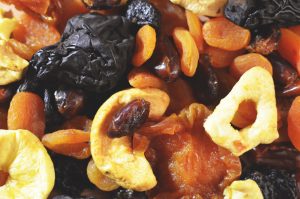 If you’ve looked for ways to extend the freshness of food when you stock up because the price is low or have grown it in your own garden, there are several methods to use, canning, freezing and dehydration are the favorite options. Do you get the same amount of nutrition from eating all these types of food, compared to fresh? In most cases, canned and frozen are just as nutritious, particularly if you grow them and can or freeze them immediately. How about dehydrated fruits and vegetables?
If you’ve looked for ways to extend the freshness of food when you stock up because the price is low or have grown it in your own garden, there are several methods to use, canning, freezing and dehydration are the favorite options. Do you get the same amount of nutrition from eating all these types of food, compared to fresh? In most cases, canned and frozen are just as nutritious, particularly if you grow them and can or freeze them immediately. How about dehydrated fruits and vegetables?
Dehydrated food is better than junk food and often cheaper.
If you grew your own food or bought it on sale, you can actually save money with dehydrated food. It’s also more compact and easier to store or transport if you’re hiking, camping or don’t have a freezer or area to store home canned goods. If you want a healthy snack for kids, dried fruit can be good. You’ll be ready for any situation that can cause a shortage of food if you have dried fruits and vegetables ready on the shelf to cover it.
So is dehydrated food less nutritious than fresh?
In some ways, it can be, but it depends on all the factors. The vitamin C and A don’t survive the heat and air used for dehydration. In order to prevent as much loss, you can use a sulfite treatment. One word of caution, when you do that, it destroys the thiamin in the fruit or vegetable. If you blanch food before you dehydrate it, it causes loss of some vitamin B complex and C. Blanching also reduces some of the water-soluble minerals available.
There are three ways to dehydrate food.
Solar drying is the cheapest method, since it uses the sun. Conditions have to be right for this technique to work. Not only should it be hot, but also dry. The second technique of oven drying and the third of using an electric dehydrator don’t require nearly the effort or precise conditions, but if you’re doing it just to save money, the cost of the energy might eat into your savings.
- Since dehydrating fruit removes the water weight, if you eat same number of grams of fresh fruit compared to dehydrated fruit, you’ll eat fewer calories with fresh fruit.
- Dehydrated foods tend to last longer and information from the University of Missouri says it won’t spoil. In order to develop yeast, mold or bacteria, water is necessary. That’s why complete drying and proper storage are so important.
- Using dehydrated food for soup can help. Since water leaches the nutrients and dissolves them in water, making water in the form of soup provides those nutrients.
- Don’t forget, you can also dehydrate herbs and spices. Some will dehydrate simply by hanging them in a room, but for a quicker process, use a microwave.
For more information, contact us today at Craig Long Fitness
